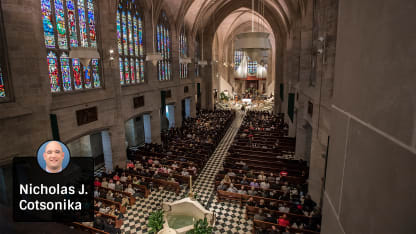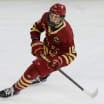DETROIT --The story of Gordie Howe was epic.
It began with his birth in Floral, Saskatchewan, the sixth of nine children; continued with his childhood in Saskatoon during the Great Depression, when he learned to skate on frozen sloughs and rivers; and climaxed during his incomparable 25 seasons with the Detroit Red Wings.
Funeral celebrates Howe's 'purpose'
'Mr. Hockey' remembered as great player, greater person

It kept going when he played with his sons in Houston and Hartford until he was 52, and it kept going still, as he played the role of Mr. Hockey until the day he died on Friday in Sylvania, Ohio, at age 88.
It ended Wednesday with his funeral, and amid all the pomp and circumstance and remembrance there was a simple message, the moral of the story.
"What was his purpose?" the Rev. JJ Mech asked during his homily. "What is our purpose?
"What did we learn from Gordie Howe?"
So many Gordie Howe stories were told by so many people over the past two days, as thousands lined up for more than 12 hours to pay their respects at Joe Louis Arena on Tuesday and hundreds filled the pews at the Cathedral of the Most Blessed Sacrament on Wednesday.
They were told by the biggest names in hockey, like Wayne Gretzky, who idolized Howe, and they were told by everyday people who had the chance to meet him somewhere along the way.
The common theme: As great as Howe was as a player -- one of the greatest of all time, if not the greatest, period -- he was an even better person. But what did that really mean? And how can his legacy live on now that he's gone?
Howe's son Murray stepped behind a lectern at the start of the ceremony, the soaring stained glass and arches of the Gothic Revival church behind him, many rows of dignitaries and a few of ordinary people in front of him, some in dark suits and black dresses, some in Red Wings jerseys and T-shirts.
He tried to sum up what he called Gordie Howe's "everlasting life" by using superlatives others had attached to him over the years. Humble and tough were just the start.
Positive. "He always had a smile on his face and a song on his lips," Murray said.
Selfless. "He never had a bad thing to say about anyone, except referees," Murray said.
Beloved. Irresistible. "He made everyone feel as if they were the most special person on the planet," Murray said.
Handsome. Wise. Graceful. Powerful. Prompt. Patient. He never raised his voice, and he accepted everyone for who he was, except a boy with long hair. That boy got a lecture.
Funny. Helpful. He would stop to pick up trash until his later years, when he would stop and point at it until Murray picked it up for him.
Fearless. Loyal. Thoughtful. Generous. An Olympia Stadium worker once lost his watch in a robbery. Gordie Howe gave him his own watch right off his wrist.
Playful. He loved to play hockey, of course. But he loved to play with his children, his grandchildren, his great grandchildren and children everywhere.
Toward the end, Murray would take him wherever they might run into children -- the rink, the store, the library -- because it would make his father come alive.
"Although he did not lead the league in church attendance," Murray said, "his life has been the epitome of a faithful servant."
Mech chose the Gospel after meeting with the Howe family for hours, compiling 14 pages of notes and praying. And what did he choose? The story of Jesus telling his disciples not to stop people from bringing children to him.
He opened his homily by asking, "What was his purpose?" He listed Gordie Howe's nicknames, statistics and accomplishments, including how he won the Hart Trophy six times and the Stanley Cup four times.
But he came back to the point again by asking, "What was his purpose? Truly?" He made it clear that it wasn't only what Gordie Howe did on the ice.
"I think we know what it was," he said.
A mere hockey player, no matter how great, does not turn a hockey arena into a cathedral and a cathedral into the center of the hockey world the way Gordie Howe did the past two days. There has to be more.
Gordie Howe's purpose in life was to bring joy to others and to set an example. He brought joy by the way he played hockey, brought joy by the way he touched people, set an example by how he treated people, taking time for everyone.
"What is our purpose?" Mech asked. "What did we learn from Gordie Howe?"
I think we know.
"So let's make Mr. Hockey proud," Mech said. "Let's make our Lord even prouder."
After Gordie Howe was taken out of the church and the crowd had started to disperse, Gretzky stood outside and answered questions. He had been at the visitation for more than 12 hours the day before. He literally could not say enough about his hero.
Eventually he had to go. But as he started to walk away, a 12-year-old boy in a Red Wings jersey piped up.
"Mr. Gretzky?" asked Issac Czudner of Windsor, Ontario, across the Detroit River. "Can I take a picture with you?"
It was hot. Gretzky was tired. His ride was waiting. His wife was waiting.
But Gretzky, who met Howe when he was 10, who became friends with him, who followed his example, stopped amid the crowd. He put his arm around the boy and looked at the camera.
And he smiled.

















